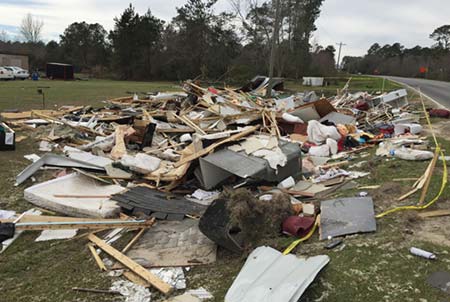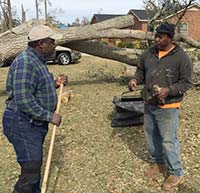
Vol. 81/No. 7 February 20, 2017
(front page)
Social catastrophe after Georgia storms is product
of capitalism


Above, remnants of trailer where Betty Lee and Jesse James Newsome were killed when tornado hit. Inset, farmer Willie Head, left, and Fred Swain in front of Swain’s home in Albany, Georgia. Outpouring of working-class solidarity since storms hit is sharp contrast to government’s bureaucratic runaround.
The huge storm system, which passed from Louisiana to South Carolina over several days and pounded eight states, spawned 40 tornadoes in Georgia alone. Hardest hit was Dougherty County, which includes Albany, the largest city in this rural part of the state, with a population of 76,000. People had barely begun to recover from a tornado that passed through the area less than three weeks earlier when another one hit Jan. 22, with wind speeds up to 150 mph.
The storms destroyed or damaged hundreds of homes, as well as farms, businesses and factories. Thousands of trees were uprooted or snapped in half like toothpicks. Thousands lost electricity when power lines were torn down. At least 21 people were killed, most of them in Georgia, and many others injured. A 2-year-old boy, Detrez Green, went missing here and has not been found. Initial estimates of damages by the state insurance commissioner were at least $100 million, on top of $30 million from the Jan. 2 tornado.
“Storms this bad are unusual for our area, especially in winter,” said Willie Head, a small farmer who lives in Brooks County. Head joined myself and Sam Manuel, Socialist Workers Party members from Atlanta, to visit some of the hardest-hit areas a few days after the storm.
“The only warning we got was an ‘amber alert’ on our cellphones at 3 a.m.,” Head said. “Who’s looking at their phones in the middle of the night?”
The two fatalities in Brooks County were Head’s friends — Betty Lee and Jessie James Newsome — a retired couple he had known for years. They were in bed when a tornado blew their mobile home onto the highway, shredding it and killing them. We met relatives who were trying to find clothing to bury the Newsomes, among debris where their trailer once stood.
“I didn’t expect to meet with so much bureaucracy after just a few days,” Aaron Sims, Betty Lee Newsome’s son, who lives in Miami, told us. The family also has to deal with a pile of county government forms they have to fill out. “They won’t even let us take anything from the garage — tools and other items we need to use,” Sims said.
A tornado struck a mobile home park in neighboring Cook County, demolishing half of the 40 homes there. Ten of those killed in the storm in Georgia lived in mobile home courts.
More working people in the South live in mobile homes than in most other parts of the country, and people living in trailer parks are far more likely to be killed in a tornado than those residing in houses. “Laws requiring storm shelters in those vulnerable communities are few and far between,” Associated Press reported Jan. 24.
“We are taxed and taxed, but what does the government do when something like this happens?” said Head. “Where is the help? People aren’t warned or evacuated, even though government people knew for hours and even a few days that the storm was coming and what its path was. Here, everyone’s left on their own to protect themselves.
“We should learn from the example of the Cuban people and their government, the way they are trained and the way they look after each other when they’re hit by storms like this,” said Head, who has visited revolutionary Cuba several times — where people and resources are mobilized to minimize loss of life and damages. “Why can’t we adopt their methods here? Here, the officials treat the loss of life almost nonchalantly.”
“Of course, it will take a revolution to do that,” he said. “But I plan to bring up these safety questions at whatever local meetings I can, to start the discussion.”
We saw an outpouring of working-class solidarity here, as workers and farmers volunteered to help neighbors, friends and fellow workers deal with the aftermath of the storm. Many churches organized volunteers to provide meals, clear debris and give whatever other assistance they could.
“This was the worst tornado in my lifetime,” Freddie Swain, a retired auto worker, who lives in one of the hardest hit parts of Albany, told us. “The tornado hit our neighborhood midafternoon. There was no alarm or other warning, except what was on TV.” His roof was damaged and a huge tree in his front yard was ripped out of the ground.
“Many others were hit much harder,” Swain said. “We were lucky because we have insurance.” But the insurance won’t pay to remove the tree, he said, because it didn’t hit the house. And that can cost $1,000 or more.
Many workers affected by the storms don’t have the resources to handle a social disaster like this. They lack home or health insurance to handle injuries and damage, and can’t cover the cost of funerals for those who were killed. Many lost everything, including clothing and medicine.
At least 20 percent or more of the population in storm-struck areas live below the federal poverty level, the Atlanta Journal Constitution reported. Four of the 16 counties under a state-proclaimed emergency decree — Calhoun, Clay, Crisp and Dougherty — are among the 100 U.S. counties with the highest poverty rate.
Gov. Nathan Deal visited the area a few days after the storm, promising some help would come eventually.
“We were not able to come until local authorities had done their assessment and asked us to come in and provide state assistance,” he told the Albany Herald a couple weeks earlier after the first tornado. “Just as the federal government will not come until the state has done its assessment and request they come in.”
It’s the opposite of how the Cubans do it.
Willie Head in Pavo, Georgia, and Sam Manuel from Atlanta contributed to this article.
Front page (for this issue) | Home | Text-version home